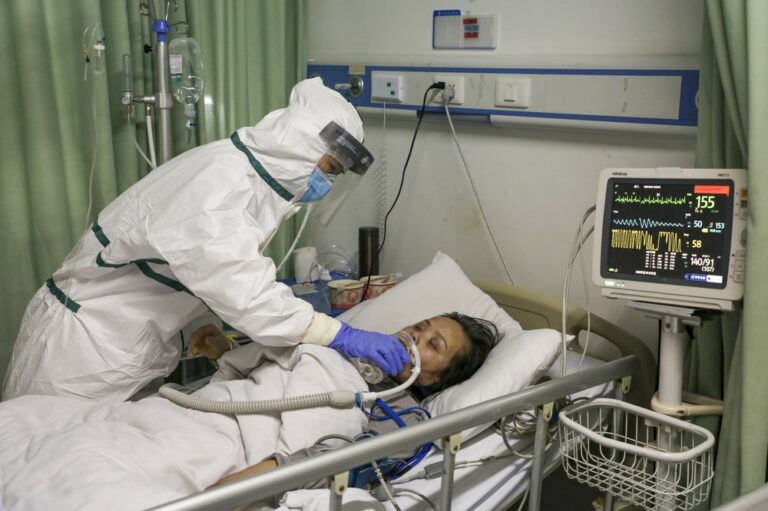The rate of increase in new cases of the virus in China rose again after a brief respite, as the death toll rose to 722 on the mainland and countries around the world enforced stricter measures to contain its spread.
A U.S. citizen died of the virus in Wuhan, the city at the center of the outbreak, in what was apparently the first American death. A Japanese being treated in Wuhan who was a suspected case also died.
Almost all of the new fatalities were in and around Wuhan in central Hubei province. Another 3,399 cases were reported, bringing the total to 34,546, although some of those have recovered. More than 320 cases have been confirmed outside mainland China, including two deaths in Hong Kong and the Philippines.
Three more cruise ship passengers were diagnosed with the virus in Japan for a total of 64 on board the ship.
China’s ruling Communist Party faces continuing anger and recriminations from the public over the death of a doctor who was threatened by police after trying to sound the alarm about the disease over a month ago.
A look at the latest developments:
AMERICAN, JAPANESE SUCCUMB IN WUHAN, CRUISE SHIPS QUARANTINED
The U.S. Embassy in Beijing said a 60-year-old U.S. citizen diagnosed with the virus died in Wuhan on Wednesday. The patient was apparently the first American fatality. The embassy did not identify the person.
Japan’s Foreign Ministry said a Japanese man in his 60s being treated in Wuhan also died. It said the patient had been suspected of having the coronavirus, but that it had not been confirmed.
Cruise ship passengers faced more woe as Japan reported three more cases for a total of 64 on one quarantined vessel and turned away another. The three are among 3,700 passengers and crew on the quarantined Diamond Princess. They must remain on board for 14 days.
Prime Minister Shinzo Abe said foreign passengers on another ship, Holland America’s Westerdam, won’t be allowed into Japan. He said suspected virus patients were on board. The ship, with more than 2,000 people, was near Okinawa and was seeking another port, said Overseas Travel Agency official Mie Matsubara.
“We are getting desperate,” she said. “We hope we can go somewhere so that passengers can land.”
Hong Kong began enforcing a 14-day quarantine for arrivals from mainland China on Saturday.
Hong Kong has refused to completely seal its border but hopes the quarantine will dissuade travelers from the mainland.
___
PUSH TO ENSURE FOOD SUPPLY IN QUARANTINE ZONES
China’s leaders are trying to keep food flowing to crowded cities despite anti-disease controls and to quell fears of possible shortages and price spikes following panic buying after most access to Wuhan and nearby cities was cut off.
Employees at the Wushang Mart wore masks and protective suits. Customers washed their hands with disinfectant and were checked for the virus’s telltale fever, said the manager, who would give only her surname, Lu.
“It is normal for people to worry about supply, but we explain there will be enough,” Lu said by phone.
Food stocks in supermarkets ran low shortly after Beijing imposed travel curbs and extended the Lunar New Year holiday to keep factories, offices and other businesses closed and the public at home in an attempt to prevent the virus from spreading.
That also kept trucks off the road, disrupting supplies of food to markets, feed to farmers and poultry to slaughterhouses. As the shutdown of Wuhan expanded to cover cities with a total of 60 million people, villagers set up their own roadblocks to keep outsiders and possible infection away.
A Cabinet official acknowledged vegetable supplies were uneven and some “daily necessities” were sold out.
Even getting out to shop is a challenge in some cities that are under almost total quarantine.
Only one member of each household is allowed out each day to shop for food in Hangzhou, an industrial metropolis of 10 million people southwest of Shanghai, and in Huanggang, a city of 1 million near Wuhan.
___
ANGER SIMMERS OVER DEATH OF DOCTOR THREATENED BY POLICE
Public anger continued to simmer over the authorities’ treatment of a young doctor who was reprimanded by police for issuing a warning about the virus before being infected and dying this week.
In death, 34-year-old Li Wenliang became the face of anger at the ruling Communist Party’s controls over information and complaints that officials lie about or hide disease outbreaks, chemical spills, dangerous consumer products or financial frauds.
The 34-year-old ophthalmologist died overnight at Wuhan Central Hospital, where he worked and likely contracted the virus while treating patients in the early days of the outbreak.
Police in December had reprimanded eight doctors including Li for warning friends on social media about the emerging threat. China’s supreme court later criticized the police, but the ruling Communist Party has tightened its grip on information about the outbreak.
Users of China’s Weibo microblogging service have left hundreds of thousands of messages mourning Li’s death and criticizing the authorities over their treatment of him and other whistleblowers.
Following the criticism, the government announced a team from Beijing would be sent to Wuhan to investigate “issues reported by the masses involving Dr. Li Wenliang.”
___
AFRICAN COUNTRIES WITH CLOSE CHINA TIES CAUGHT UNPREPARED
The virus has yet to be confirmed in Africa, but global health authorities are increasingly worried about the threat to the continent, where an estimated 1 million Chinese now live, as some health workers warn they are not ready to handle an outbreak.
Countries are racing to take precautions as hundreds of travelers arrive from China every day. Safeguards include stronger surveillance at ports of entry and improved quarantine and testing measures across Africa, home to 1.2 billion people and some of the world’s weakest systems for detecting and treating disease.
But the effort has been complicated by a critical shortage of testing kits and numerous illnesses that display symptoms similar to the flu-like virus.
“The problem is, even if it’s mild, it can paralyze the whole community,” said Dr. Michel Yao, emergency operations manager in Africa for the World Health Organization.
(AP)











